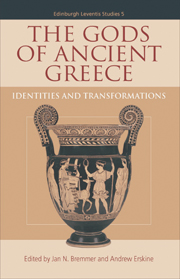Book contents
- Frontmatter
- Contents
- Preface
- List of Illustrations
- Notes on Contributors
- List of Abbreviations
- Introduction: The Greek Gods in the Twentieth Century
- 1 What is a Greek God?
- PART I SYSTEMATIC ASPECTS
- PART II INDIVIDUAL DIVINITIES AND HEROES
- PART III DIACHRONIC ASPECTS
- 14 Early Greek Theology: God as Nature and Natural Gods
- 15 Gods in Early Greek Historiography
- 16 Gods in Apulia
- 17 Lucian's Gods: Lucian's Understanding of the Divine
- 18 The Gods in the Greek Novel
- 19 Reading Pausanias: Cults of the Gods and Representation of the Divine
- 20 Kronos and the Titans as Powerful Ancestors: A Case Study of the Greek Gods in Later Magical Spells
- 21 Homo fictor deorum est: Envisioning the Divine in Late Antique Divinatory Spells
- 22 The Gods in Later Orphism
- 23 Christian Apologists and Greek Gods
- 24 The Materiality of God's Image: Olympian Zeus and Ancient Christology
- PART IV HISTORIOGRAPHY
- Epilogue
- Index
21 - Homo fictor deorum est: Envisioning the Divine in Late Antique Divinatory Spells
from PART III - DIACHRONIC ASPECTS
Published online by Cambridge University Press: 05 August 2013
- Frontmatter
- Contents
- Preface
- List of Illustrations
- Notes on Contributors
- List of Abbreviations
- Introduction: The Greek Gods in the Twentieth Century
- 1 What is a Greek God?
- PART I SYSTEMATIC ASPECTS
- PART II INDIVIDUAL DIVINITIES AND HEROES
- PART III DIACHRONIC ASPECTS
- 14 Early Greek Theology: God as Nature and Natural Gods
- 15 Gods in Early Greek Historiography
- 16 Gods in Apulia
- 17 Lucian's Gods: Lucian's Understanding of the Divine
- 18 The Gods in the Greek Novel
- 19 Reading Pausanias: Cults of the Gods and Representation of the Divine
- 20 Kronos and the Titans as Powerful Ancestors: A Case Study of the Greek Gods in Later Magical Spells
- 21 Homo fictor deorum est: Envisioning the Divine in Late Antique Divinatory Spells
- 22 The Gods in Later Orphism
- 23 Christian Apologists and Greek Gods
- 24 The Materiality of God's Image: Olympian Zeus and Ancient Christology
- PART IV HISTORIOGRAPHY
- Epilogue
- Index
Summary
At Odyssey 16.161, the poet tells us ‘the gods do not show themselves clearly to everyone’, and there is no reason to doubt him. In this passage it is only Odysseus – and, interestingly, a group of dogs – who realize that Athena is among them. Telemachos, although standing nearby, is unaware of her presence. In other cases, no one at all recognizes a god in their midst: the royal family of Eleusis lives for weeks without knowing that they have Demeter as their nursemaid. Later Greek narratives, too, indicate that the gods were hard to recognize. Semele is so uncertain about whom she has been sleeping with – Zeus or a mortal man pretending to be Zeus – that she risks her life to find out, and loses the bet – or wins it, depending on how you look at things. After all, it turns out that Semele was right and her so-called maidservant, Beroë, was wrong. If only Semele had stopped worrying about who her paramour was and started worrying instead about who Beroë really was – namely, Hera in disguise – she would have been better off.
Outside of narrative, certainty that one was interacting with the gods was hindered not so much by divine disguises as by what we have to call simple paucity of proof: one presumed that a god was present during cult worship because one had performed a hymn invoking him, provided meat on his altar and done other things to make the situation inviting, but we rarely hear of any tangible signs – visible, audible or otherwise – that confirm presence.
- Type
- Chapter
- Information
- The Gods of Ancient GreeceIdentities and Transformations, pp. 406 - 421Publisher: Edinburgh University PressPrint publication year: 2010

